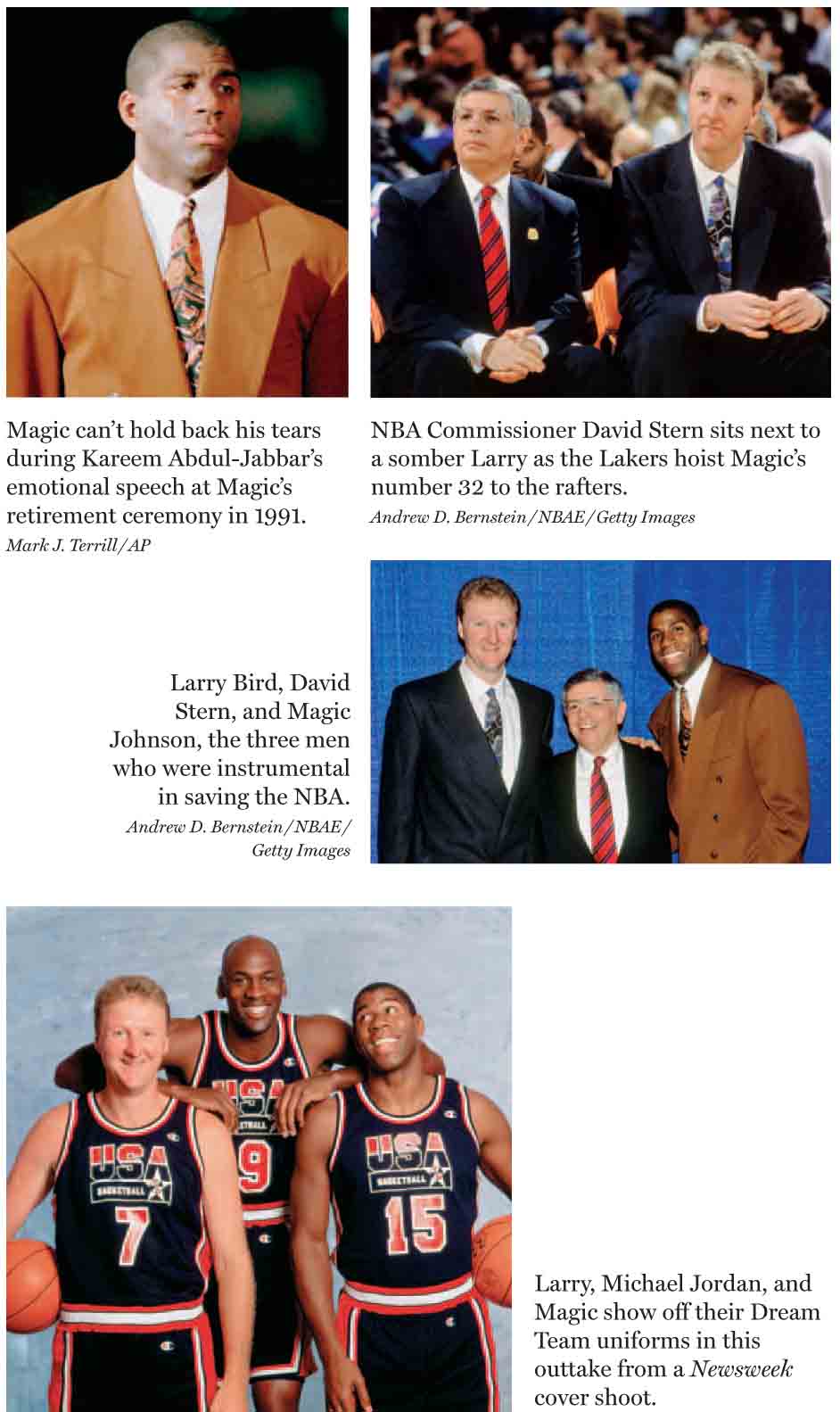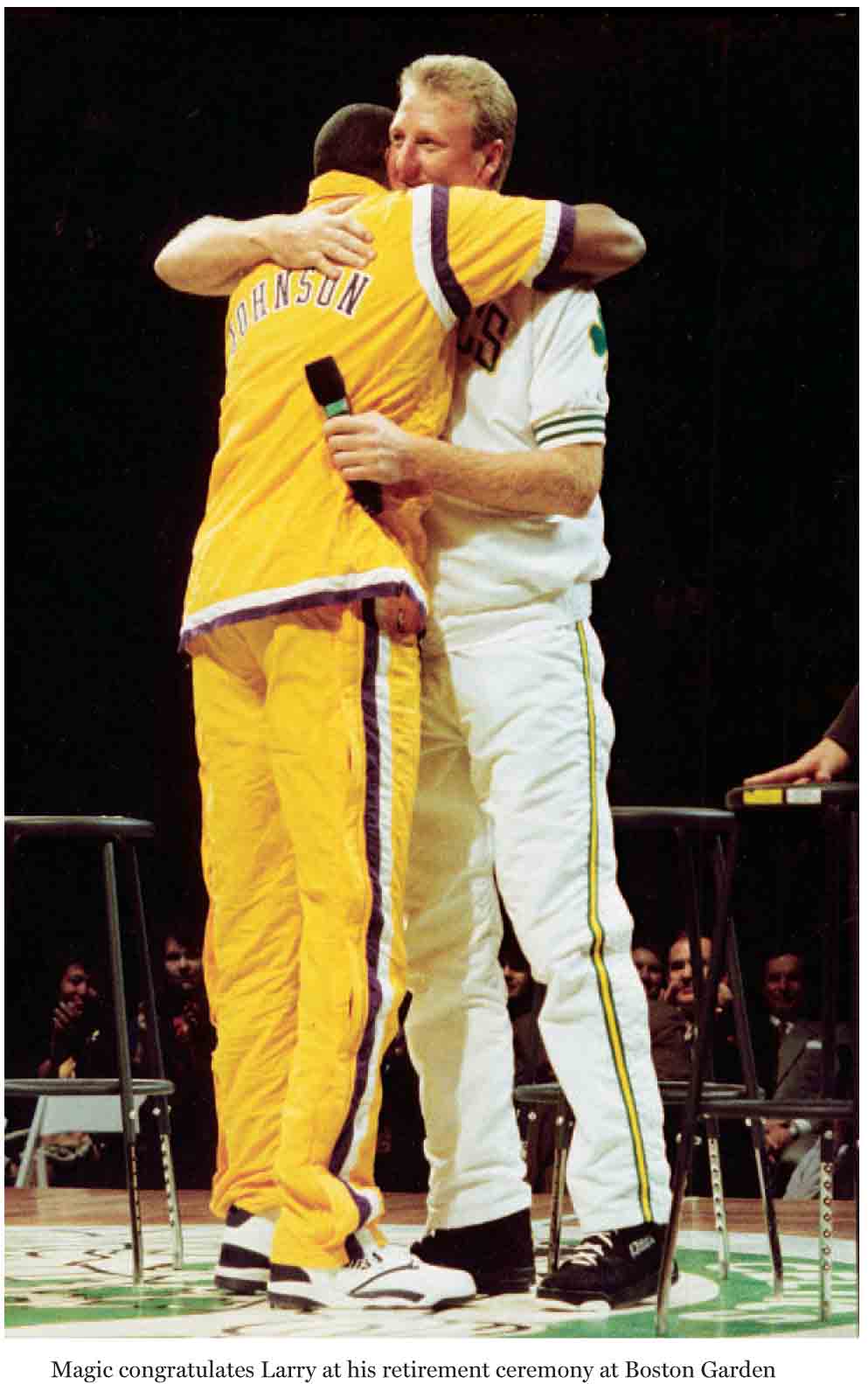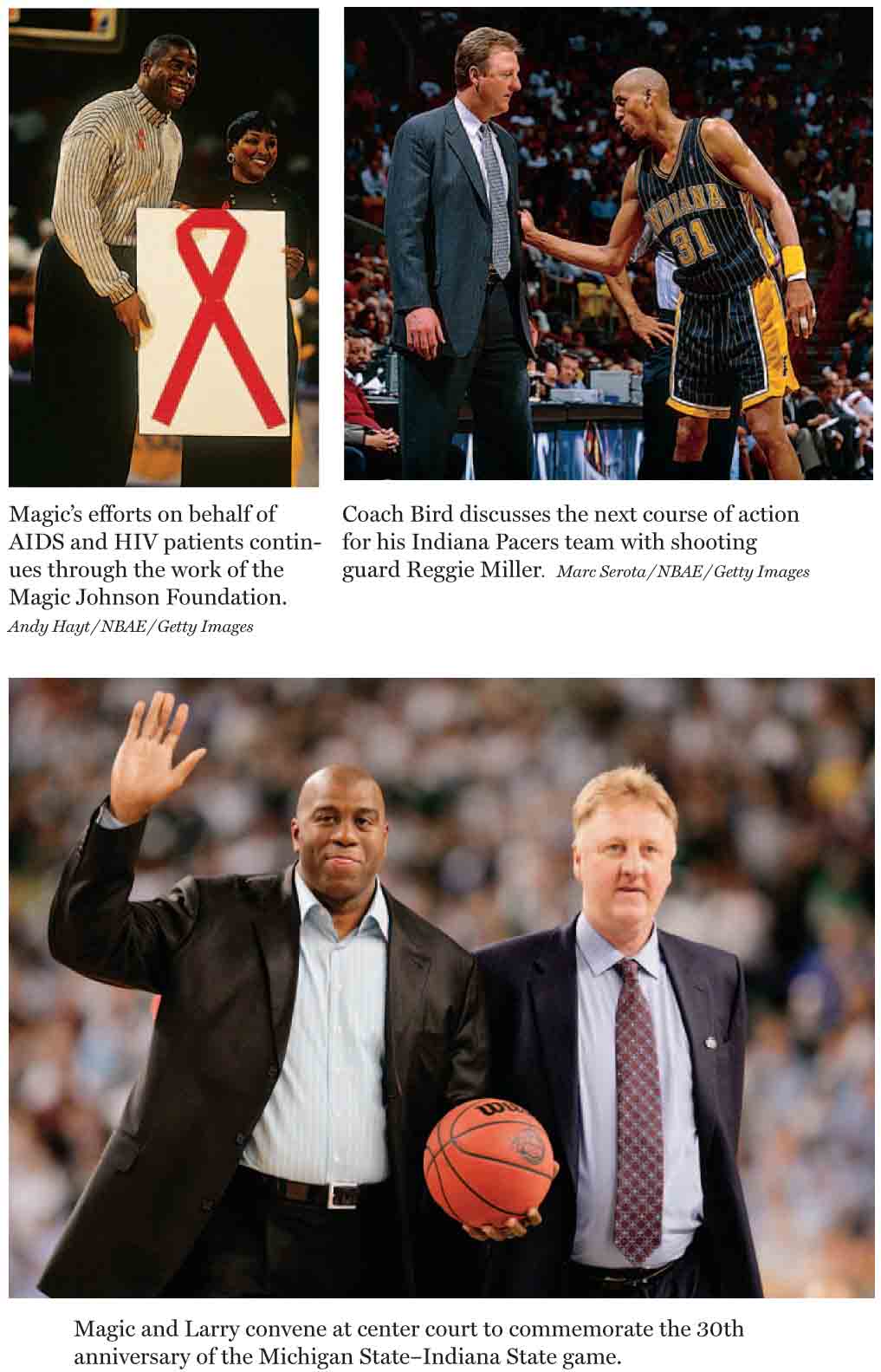When the Game Was Ours (30 page)
Read When the Game Was Ours Online
Authors: Larry Bird





Boston, Massachusetts
L
ARRY BIRD WAS OPEN
, and there was nothing Magic Johnson could do about it.
The ball had swung around from one Celtics threat to the next, from Dennis Johnson to Danny Ainge and then, in the deep left corner, to Bird, the basketball player Magic feared most.
How could Bird be left alone like that, even for a second? Later, watching film, Magic would see that, a moment before, James Worthy had yanked Bird's number 33 jersey to prevent him from wriggling free. Had the referee spotted him it would have been a foul, but Worthy surmised correctly that the officials were concentrating on the top of the key, where D.J. was holding the ball. When D.J. passed it to Ainge on the left elbow, Worthy did what he was supposed to do: he rotated to put a hand in the face of Boston's young shooter. Ainge saw him coming and dumped the ball to Bird in the corner.
Lakers big man Mychal Thompson, a newcomer to this rivalry, was a sliver late in reacting. He knew instantly that his hesitation had cost him, so he charged to the baseline, his arms outstretched, in an urgent attempt to disrupt the sniper from hitting his mark. As Thompson lunged toward Bird, he looked for some indication that the forward was off-balance, or rushed, or distracted.
"There was none of that," Thompson said. "He was cold, lifeless. Like a shark."
Bird's shot was perfectâa dead-on three-pointer that instantaneously deflated the city of Los Angeles, as well as the proud franchise that bears its name. The Celtics, down 2â1 in the 1987 NBA Finals to the Lakers, had just gone ahead by two points with 12 seconds left, and it was all too familiar. As Magic jogged to the sidelines, trying to ignore the uproarious reaction of the Boston Garden fans, his temper flared.
"How could you leave him alone?" Magic berated his teammates in the huddle. "Everyone in the building knew he was taking that shot. Did any of you actually doubt he could hit it?"
No one responded. Magic surveyed their expressions and understood he needed to move onâquickly. "If we dwelled on the sting of Bird making that shot," he said, "we were going to lose."
Johnson thumped his hands together and changed his tone. "C'mon, fellas," he said, "plenty of time."
Coach Pat Riley drew them close in the huddle. The Lakers championship in 1985 had exorcised the doubt from 1984, and the coach detected a resolve in Magic that hadn't been present three seasons earlier. There was no hint of panic from him in the huddle. The young buck had grown up.
"Run 'fist,'" Riley told Magic as the Lakers returned to the parquet.
LA's patented "fist" play called for three Laker players to clear out while Johnson brought the ball up the left side of the floor with Ka-reem Abdul-Jabbar establishing position in the post. Once Magic made the entry pass into Kareem, the big man had the entire left side of the court to maneuver. Abdul-Jabbar gathered in the pass, wheeled to the middle, and was fouled.
Kareem had already missed three free throws in the game. Magic was relieved when his first throw dropped through, but the second one rolled off, and Kevin McHale and Robert Parish converged at the exact same moment in pursuit of the rebound. If they held on, Boston would have the ball, the lead, and very likely a tie series.
McHale appeared to have possession, but he collided with Parish and then received a bump from behind from Thompson, his friend and former college teammate. The incidental contact from the Laker forward was just enough to jar the ball free and send it bouncing harmlessly out of bounds.
So now the Lakers had the ball, down by one with seven ticks on the clock. For a decade, the only logical choice in the waning seconds of a game was Abdul-Jabbar. Riley could go to his big man again, as he had done one possession earlier, or he could diagram some screens for his own sniper, Byron Scott. There was Worthy, who was quick and elusive and could draw a foul. And then there was Magic, who had been waiting his entire career for a scenario like this: a chance to strike down Bird and Boston by finishing the job himself instead of dishing it off to someone else down the stretch.
Michael Cooper inbounded the ball under the basket. Magic, situated on the left side of the floor, came to meet the pass and McHale flashed out to meet him. The snapshot was framed: Magic, the 6-foot-9 point guard and 1987 MVP, against McHale, a first-ballot Hall of Famer and defensive force who had been hobbling through the series with a broken foot. Although McHale was a power forward, he made a living guarding smaller players, relying on his innate timing, his long, long arms, and his deceptive quickness for a man in a 6-foot-10-inch frame.
As McHale assumed his defensive stance, Magic instinctively thought "pass." He glanced over at Kareem, at Worthy, at Scott. They were all covered.
Magic leaned in, leaned out, and stutter-stepped past McHale, dribbling toward the middle. Parish moved over to help, but Magic was a step ahead of both.
Bird, sagging off Michael Cooper on the opposite side of the key, saw Johnson head toward the heart of the key. "Good," Bird said to himself. "He's going to the middle. We've got lots of help there."
With Boston's Big Three of McHale, Parish, and Bird flocking toward him, Magic left his feet.
"I still wasn't sure at that point if I was going to shoot it," Magic said.
Kurt Rambis, watching from the bench, thought Magic was contemplating flipping the ball over his head to Kareem. It was an option that Rambis prayed Magic wouldn't choose, because he was certain the ball would be deflected.
Magic swooped the ball into the air, extending up, up, up with a hook shot as the three Boston players extended along with him. Rambis was transfixed by the ball's high, arching trajectory. "It seemed to hang up there forever," he said.
The choice of weapon was no fluke. Magic had spent the previous summer at Michigan State working on his post moves with Jud Heathcote, honing the hook shot so he would be comfortable launching it with either hand.
Bird was surprised that Magic chose to keep the ball and equally stunned at how effortlessly he executed a shot that takes years to master. As he watched his rival expertly flip his wrist, Bird experienced the overwhelming and sinking feeling of helplessness.
Magic Johnson was open, and there was nothing Larry Bird could do about it.
Magic's "junior junior" hook dropped through like a plump raindrop into a bucket of water. On the sideline, Pat Riley raised his fist triumphantly.
"I had been waiting on that moment," Magic said. "I was calm, ready. I had been taking the last shot all year, so it was second nature to me.
"If I had taken it in '85, I probably would have missed. I would have been too excited. It wasn't until '87 that I really understood and appreciated what Larry had been doing all along by taking all those big shots."
Five seconds had elapsed during Magic's drive to the hoop, leaving two seconds for Bird to pull off a miracle for his team.
Boston's final play was simple. D.J. threw it in the corner to Bird in nearly the identical spot where he had drilled the three-pointer seconds earlier. As Bird launched the final shot, he experienced a momentary surge of excitement.
"Oh, God, it's in," Magic thought as he followed the flight of the ball. "He's going to do it to us again."
The jump shot was straight, perfectly on line with the basket. As he released it, Bird fell backward, nearly into the lap of the Lakers bench.
"It had perfect rotation," Bird said. "I was sure I had it."
Bird was only half-right. The ball was perfectly on line, but it hit iron and bounced out. The Lakers won and, with a 3â1 advantage in games, were in complete control of the series. As Bird left the court, he looked over at Riley, who was hugging Magic Johnson as if he hadn't seen him in a month. Bird briefly made eye contact with the Lakers coach, but said nothing.
"Riley knew he was lucky," Bird said. "I guarantee you he thought that shot was dropping."
"I thought it was in," Riley confessed. "We got lucky. But the game ended as it should. It truly was Magic's time."
Mychal Thompson, the number-one pick in the 1978 draft (five spots ahead of Larry Bird), spent seven years in Portland and a half-season with San Antonio gawking at the Lakers and Celtics. He was captivated by the rivalry of Bird and Magic and envious, like hundreds of other NBA stars, that he wasn't able to play a role in their sizzling competition.
"We used to sit around saying, 'When are we ever going to be good enough to pass those guys?'" Thompson said. "We knew the answer. They had Magic. They had Bird. Never."
Following their premature exit from the playoffs in 1986, the Lakers contemplated shuffling their personnel. Their futile efforts against Houston's Twin Towers and their ongoing struggles to contain McHale made acquiring a big man with size their top priority. Just as the Celtics had done two years earlier when they tailor-made their alterations to offset Magic by acquiring Dennis Johnson, the Lakers franchise was tweaking its roster specifically with Boston in mind.
Owner Jerry Buss talked seriously with Dallas about swapping Worthy for rookie center Roy Tarpley and Johnson's friend Mark Aguirre. Strong objections from West and Magic prevented the deal from going through. Tarpley evolved into one of the NBA's great teases: he exhibited flashes of brilliance but didn't excel because he was unable to control his drug problems. Worthy, meanwhile, just kept making the All-Star team. Aguirre eventually landed in Detroit with his other ally, Isiah Thomas.
During one of Magic's junkets to Las Vegas with Buss, his owner asked him what they needed to vault them over the top. Johnson had not forgotten his college visit with Mychal Thompson nearly ten years earlier. He felt that Thompson's personality would mesh well with the team, and he hoped that Thompson, who played at Minnesota alongside McHale, might have insight on how to contain Boston's rapidly improving low-post connoisseur.
On February 13, 1987, Thompson was dealt to the Lakers for Frank Brickowski, Petur Gudmundsson, two draft choices, and cash. Bird noted the transaction with little trepidation. Thompson wasn't someone he feared, although he knew McHale dreaded guarding him, a phobia that stemmed from their days together at Minnesota when Thompson embarrassed the freshman McHale in practice.
